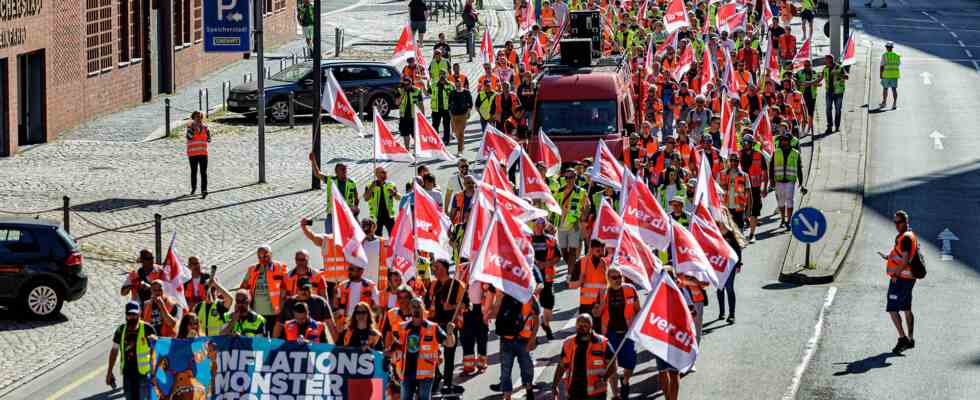Status: 06/23/2022 1:41 p.m
Three weeks after the first warning strike in Germany’s major seaports, the dockers have once again stopped work. In order to push through higher wages, they want to paralyze ship handling for 24 hours.
The dockers at the major German seaports have once again stopped working. The handling of container and cargo ships is standing still in Emden, Bremen, Bremerhaven, Brake, Wilhelmshaven and Hamburg, said ver.di negotiator Maya Schwiegershausen-Güth at a rally in Hamburg.
“We need a big swig from the bottle, we need a big wage increase,” she said in front of more than 4,000 strikers, the union said. They stopped work for 24 hours from the morning shift.
The union is demanding higher hourly wages
Even after four rounds of negotiations, ver.di and the Central Association of German Seaport Companies (ZDS) were unable to come to an agreement. The union demands 1.20 euros higher hourly wages for a collective bargaining term of 12 months. Hourly wages of 15 to 28 euros are currently common.
According to the ideas of ver.di, there should also be an annual allowance of 1200 euros in full container systems. In addition, the union wants to achieve an “actual compensation for inflation”, which it does not specify in detail.
Union offers 7.2 percent increase
The ZDS is currently offering to increase hourly wages by EUR 1.20 for a contract term of 18 months. The association has agreed to the allowance of 1200 euros and also proposed a one-off payment of 1000 euros in full container operations and 500 euros in conventional ones as inflation compensation.
“We offered an immediately effective volume of up to 11 percent, including a permanent increase in wages of up to 7.2 percent,” said ZDS negotiator Ulrike Riedel. This is well above similar wage agreements.
Around 12,000 port workers are employed in the 58 collective bargaining companies in Hamburg, Lower Saxony and Bremen.
More delays
The Kiel Institute for the World Economy estimates that more than two percent of global freight capacity is stuck in traffic jams in the North Sea due to the corona pandemic. 15 container ships are currently waiting to be cleared in Hamburg or Bremerhaven.
The strike could now lead to further delays. The loading and unloading of the ships had already come to a standstill during the eighteen-hour warning strike three weeks ago, causing more delays.
The new warning strike could affect overseas trade. The Hamburg shipping company Hapag-Llyod spoke of considerable damage. “Every day that a ship stands still costs us money, of course, and annoys customers, consumers, seafarers and also our shore staff,” said a spokesman. In his opinion, the strikes damaged the reputation of the Port of Hamburg.

